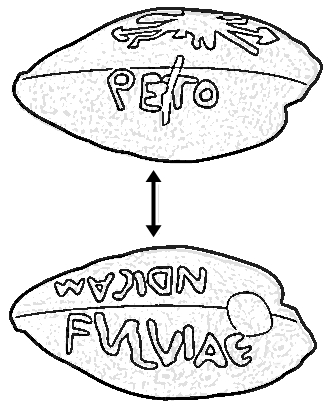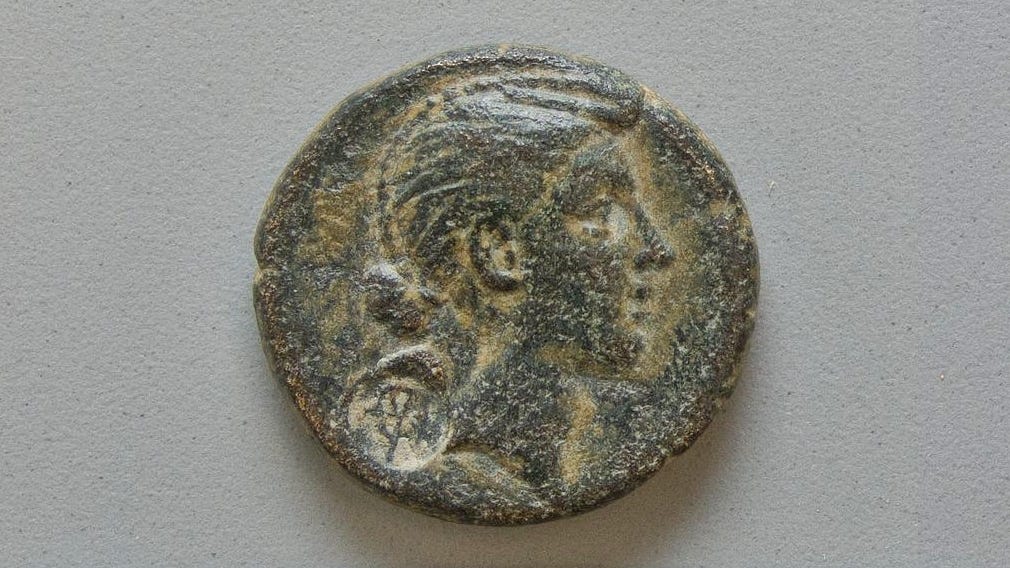Aimed at Fulvia's Fanny?
Examples of Obscene Latin in the First Century BC

*Contains language that may offend*
At the siege of Perusia in 41-40 BC, Caesarian and Antonian legionaries cast lead sling bullets inscribed with insults. In his excellent new book, Slingers and Sling Bullets in the Roman Civil Wars of the Late Republic, 90-31 BC, Lawrence Keppie translates the foulest examples. Lucius Antonius’ besieged legionaries hurled bullets with insults like
PET(O) / OCTAV[I]A / CVLVM - ‘I’m aiming for Octavia’s arse!’ (ILLRP 1108)
OCTAVI / FELAS - ‘Octavius, you cocksucker!’ (CIL XI 6721, 9a-b)
LAXE / OCTAVI / SEDE - ‘Limp Octavius sit yourself down (on me)!’ (ILLRP 1109)
The first insult was probably directed at Octavian Caesar rather than his sister, Octavia, implying effeminacy and mocking the grand name he acquired following his adoption by Julius Caesar. On the other bullets he is dismissed as mere Octavius. Keppie follows Benedetti to translate laxe as ‘limp’, but it surely refers to Octavian's ‘loose’ or ‘gaping’ backside rather than his flaccid appendage. Peto Octavia culum could be rendered even more forcefully: ‘I’m attacking Octavia’s anus’:

Octavian’s legionaries responded with
L•A• CALVE / FVLVIA / CVLVM PAN[DITE] - ‘Bald L(ucius) A(ntonius) (and) Fulvia, open wide your arses!’ (ILLRP 1112)
Perhaps the most (in)famous bullet from Perusia is inscribed PETO / LANDICAM / FVLVIAE (ILLRP 1106). Landica was considered the most obscene word in the Latin language. The orator Cicero was at pains to avoid accidental combinations of words that might sound like landica and offend his audience. The uncouth legionaries at Perusia had no qualms about using the shocking term.

Professor Keppie translates peto landicam Fulviae as ‘I’m aimed at Fulvia’s fanny’. That Fulvia, the wife of Mark Antony, was not actually present in Perusia (she was at Praeneste) did not matter to Octavian’s legionaries. While Antony was abroad, Fulvia was the determined and charismatic figurehead of his faction in Italy.
And no, American readers, the bullet was not aimed at Fulvia’s backside. Fanny is used very much in its British slang sense. Keppie’s alliterative translation captures the dark, violent and obscene humour of Octavian’s legionaries, but landica was rather more anatomically specific than fanny; it was aimed at Fulvia’s clitoris.

The Latin word for sling bullet was glans. It meant acorn and missiles were often made in that shape. Landica was perhaps derived from glandica, a ‘little acorn’.
Glans was also used, as today, as a technical medical term for part of the male genitalia but in Latin slang it signified the whole penis. It will come as no surprise that some glandes from Perusia were decorated with phalluses.


Cunnus was another word that troubled the cultured Cicero. It occurs in the earliest known Latin curse tablet (CIL IV 9251). In the first century BC, an aggrieved woman in Pompeii cursed a love rival in no uncertain terms. The curse consecrated the rival to the Infernal Gods in the hope she would be disfigured, diseased and go insane, thus causing the male lover to despise her and forsake her cunnus.
In Italy Before Rome: A Sourcebook (2022), Katherine McDonald notes ‘the presence of one Latin obscenity, cunnus’ in the curse, but translates the word as vagina. This is understandable in a Routledge sourcebook that may be used in schools but it robs the curse of its spite and fury. Antonio Varone’s forthright version, ‘may she remain with empty cunt’, provides the appropriate translation of the obscenity and underlines the viciousness of the curse (Erotica Pompeiana, 2002).
Cicero worried about obscene language. Legionaries and vengeful women did not.
Further Reading
J.N. Adams, The Latin Sexual Vocabulary (London 1982)
L. Benedetti, Glandes Perusinae. Revisione e aggiornamenti (Roma 2012)
E.W. Fay, ‘Greek and Latin Word Studies’, Classical Quarterly 1 (1907), 13-30
J.P. Hallett, ‘Perusinae Glandes and the Changing Image of Augustus’, American Journal of Ancient History 2 (1977), 151-171
J. Lawrence, ‘Take That!’, EIDOLON (2019)
K.F. Zangemeister, Glandes Plumbeae Latine Inscriptae (Ephemeris Epigraphica 6) (Berlin 1885)

